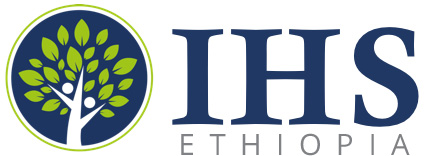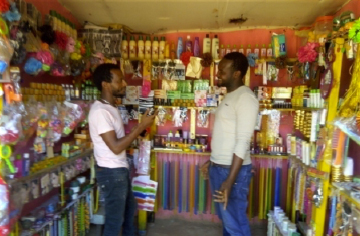Feisel Ali
Self-reliance through leather ball making in refugee camp.
Innovative Humanitarian Solutions (IHS) through its funding from UNHCR organized short term a Vocational Skill Training (VST) opportunity for 16 (5F) youths to supplement their livelihoods and self-reliance. The group went through leather ball making training for three weeks in 2015. After completion of the training, IHS also organized business development skill training, provided startup kits to the group of 16 youths, and started them in leather ball production.
The group continues with 9(3F) members. They named themselves “Amanda” which means Hope. The group members reorganized themselves again at the beginning of 2016 in the Shimelba Refugee Camp in Ethiopia. Their plan is to produce and sell leather balls into the refugee and local markets as per the training and the skill they have gained. As the result “Amanda” has started producing and selling quality and competitive leather balls to different agencies and individuals who are mainly engaged in the refugee operation. Since its establishment “Amanda” has earned a total of birr 150,000+. In addition to their monthly based cash distribution for an individual’s home consumption and procurements of additional raw materials such as leather, adhesive, threads etc,. the group has deposited 45,000 birr in Dedebit Micro Finance, Shiraarro branch.
Feisel Ali, 30 years old, is one of the leather ball making team members. He has five dependent family members. Other than the WFP monthly ration, which is not sufficient, Feisel and his family, like many of the refugees, does not have any source of income to feed his family and to keep them healthy. Nor does he have a source for clothes to dress well. And even now the size of the food ration from WFP has decreased. As Feisel puts in his own words,”I was dressing in only one trouser and one t-shirt for three solid months that I had during my arrival.” In addition, many of the youths like Feisel sit idle for years in the camp since day one that they arrived. As the result, they were exposed to different social evils such chewing Khat, drinking alcohol, becoming depressed, getting involved in commercial sex (mainly the females) and many other economic problems. Finally, the collective effect of this lifestyle leads youths to become hopeless, sometimes lose their consciousness and even at times became victims of acute mental illness.
But Feisel was different and strong enough! He kept looking for some job opportunities and any other support that would bring him hope and prosperity until he could officially resettle or repatriate with his family. In the meantime, Feisel heard about IHS’s arrival in the camp with a plan to organize vocational skill trainings for those who have interest, capacity and willingness to be trained. He thought the time is pretty close for him to realize his dream. IHS together with Administrative for Refugee and Returnee Affairs (ARRA) the government body, UNHCR and RCRCCCs the refugee representatives joined together to start the beneficiary’s selection based on the stated and agreed criteria. Fortunately, Feisel got the opportunity and passed through the vocational skill training successfully. Now Feisel and his group members started to plan and think about how they could start the production of quality balls to compete and penetrate in the given market. They wanted to sell their final products at the affordable price compared to the imported once.
Through IHS’s technical support and the market linkages with different agencies, the group keeps its production and selling capacity that boosts its income level as mentioned in above. For Feisel this was not an end in itself. He still has a big dream and wants to save some of his income and think again about what he could do with the money he saved. Finally, he came up with a business idea that would be possible to run simultaneously with his group work. Immediately he just decided to open a small shop in the camp which contains cosmetics, handmade traditional Kunamma’s jewelries and other related items like body soap etc. Over time he expanded the sales volume of the shop in quality and quantity and increased his income. Currently Feisel’s capital reaches ETB 40,000 and is equal with his family’s monthly food consumption support.


